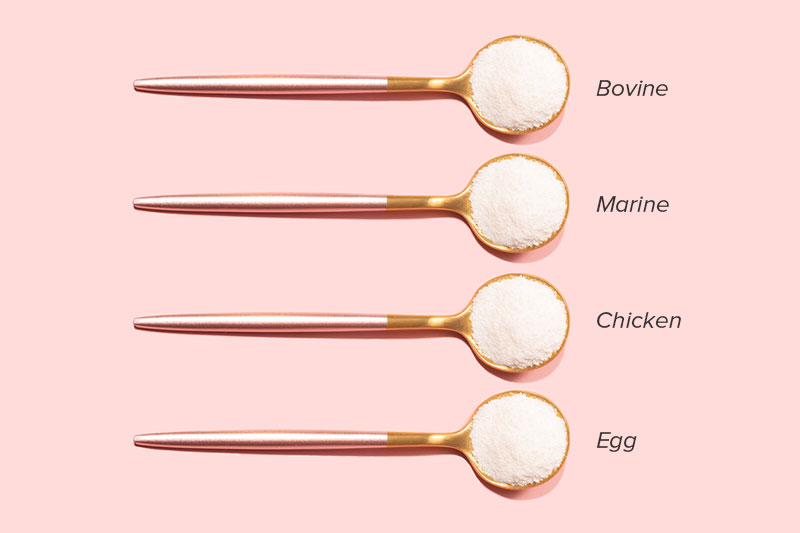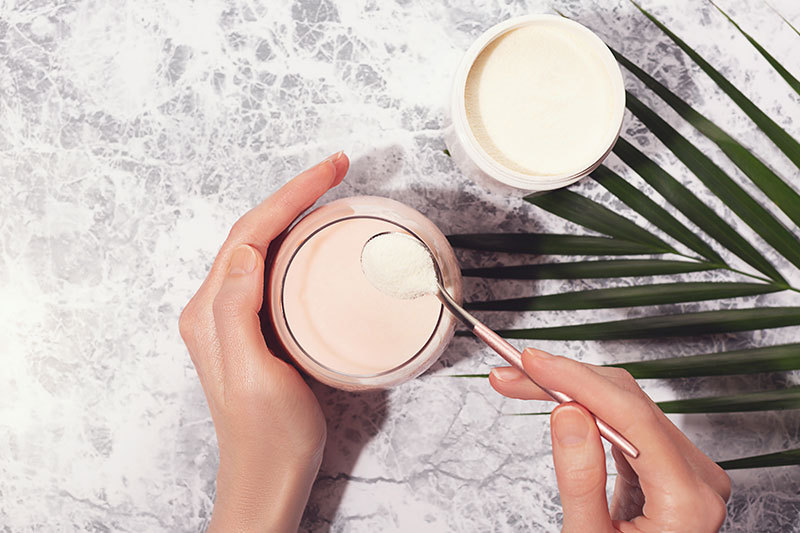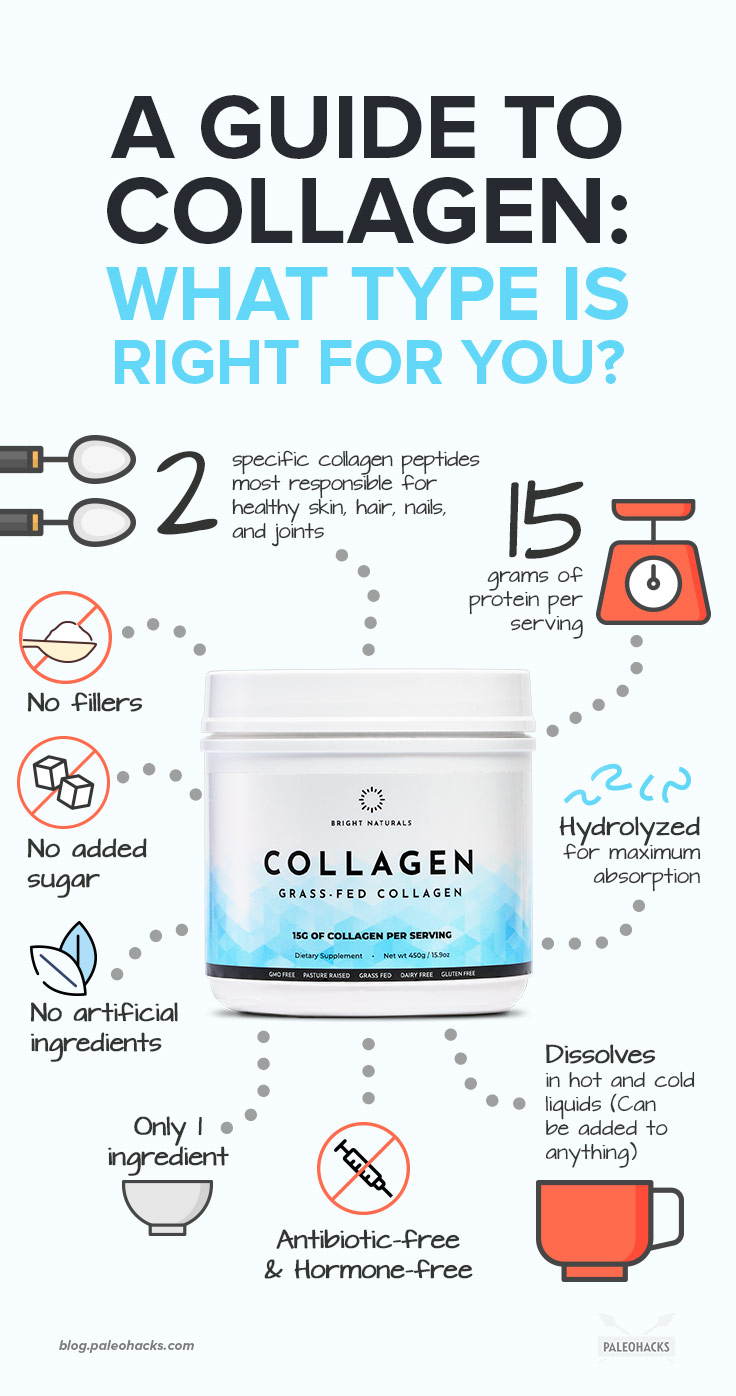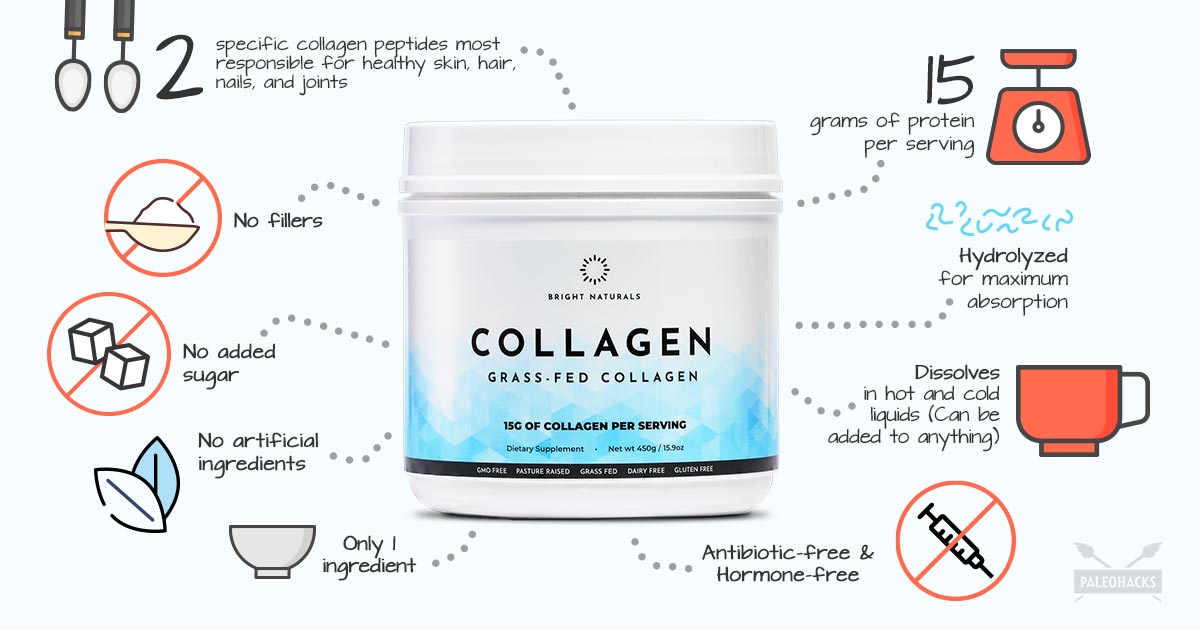Collagen is all the rage nowadays. From liquid shots to powders, it’s known for giving you the “glow”, reducing skin aging, boosting joint health, and more.
If you’re finally ready to dive in and try a supplement, we have everything you need to know before you hit the aisle.
Why Collagen?
If you want to have healthy, supple skin, ligaments, joints, bones, blood vessels, and organs, having healthy collagen levels is a must.
Want naturally radiant skin? We’ve created a FREE guide to give you the best tips & tricks for natural skincare.
Click here to get your FREE copy of our Skincare Guide!
Collagen is found throughout our entire body and basically acts like a “glue” that holds everything together. It’s particularly effective for keeping skin supple, as it acts as a matrix of fibers that holds our skin in place and keeps it elastic to avoid sagging. It’s also extremely important when we consider joint health, because collagen is found between our joints. If we don’t have enough, joints can rub together and become an extreme source of pain.
Collagen production also naturally decreases as we age; hence, the reason we see sagging skin and start to ache around our hips, elbows, and knees.
Collagen is also abundant in essential amino acids our body uses to grow and maintain healthy muscles and bones.
Types of Collagen
While it’s easy to assume all collagen is the same, there are actually 16 types in the human body. However, the majority falls into 3 categories: Type I, Type II, and Type III, with Type I specifically accounting for the most. These are also the types most prominent in collagen supplements.
- Type I Collagen is the most abundant form in your body, and makes up tendons, organs, ligaments, and skin. It’s also found in bones and plays a huge role in wound healing due to its fibers than help hold tissue together. It’s also found in abundance in your gut lining. (1)
- Type II Collagen is the type that forms and makes up our connective tissue, such as cartilage. This is why you’ll often see Type II Collagen in joint health supplements. (2)
- Type III Collagen is similar to Type I Collagen, and is found in similar areas, such as your skin, where it helps keep it elastic and supple. However, it is also found in heart tissue and in blood vessels, and has been associated with various vessel and heart conditions if you don’t have enough. (3)
Which Collagen is Best?

To further add to the layers of collagen, you’ve probably noticed there are different sources, namely bovine, marine or fish, or chicken.
Bovine collagen (also referred to as beef collagen) comes from the skin, muscle, and bones of cows. It is rich in Type I and Type III collagen, so you’ll find it being used often in skin and hair supplements, as well as anti-aging supplements, since it can help keep the collagen in your skin taut and supple.
Marine or fish collagen comes from, you guessed it, the bones, skin, and flesh of fish. Rich in Type I collagen, marine is great for use for skin health and anti-aging. In addition, studies show marine collagen is more absorbable than other animal forms of collagen due to its low molecular weight. (4)
Chicken collagen is rich in Type 2 Collagen, which is geared mostly toward improving joint health. (5)
Egg collagen derived from the shells and whites of eggs is another good source of Type I collagen, although this form isn’t as popular as marine, bovine, or chicken. It does have a bit of other types, such as Type III as well. (6)
Keep in mind that synthetic forms of collagen do exist, and are usually cultured from several molecules, hydrogels, and peptides. These are mainly produced for those who have immune reactions to animal collagen. The technology is fairly new, so we recommend sticking to animal collagen sources for now. (7)
What About Collagen Peptides?
Collagen peptides are a popular option when it comes to collagen supplements. They contain every nutrient and amino acid that collagen does, but have simply been broken down into shorter chains of proteins through a process called hydrolysis. Our bodies naturally break down collagen into peptides to be used, so this process gives us a head start, although it can be considered a less “natural” method of supplementing collagen than others.
This pre-breaking down of collagen can make it more absorbable in your gut, so if you have gut issues, this may be a better way for your body to get a maximum dose of collagen. (8, 9)
How to Find Effective Collagen
The main thing to keep in mind when shopping for a collagen supplement is what you’re using it for. If it’s for anti-aging and skin purposes, go for bovine or marine collagen (marine if you need a more absorbable form with less Type III); if you need collagen for joint health, aim for chicken or egg collagen, or even a peptide supplement geared toward joint health.
Also, for absorption’s sake, look for “hydrolyzed” collagen. This refers to the hydrolysis process collagen goes through to increase bioavailability.
Another thing to consider is looking for a collagen supplement that contains vitamin C. This is because vitamin C is crucial to collagen production, and can help collagen work its magic easier. (10)
Finding Good Quality Collagen

Now, about that wall of collagen supplements …
First and foremost, you want to look for purity in your supplement. Whether it’s a liquid in a bottle, a powder, a capsule, or a gummy or chocolate, make sure it only contains natural ingredients.
A pure, hydrolyzed collagen, perhaps with added vitamin C, can do the trick in a jiffy if you don’t want to worry about drinks or eating anything. Still be sure to check that there are no fillers or added preservatives.
A bonus is to look for animal collagen that has been derived from grass fed or free range animals, since you’re consuming a part of their flesh. In the same way you would buy organic or pastured meat or eggs, consider that this is simply another part of the same animal.
You can also try collagen supplements with added anti-inflammatory herbs and antioxidants for boosting joint or skin health.
Dosage
Many studies involving collagen have patients taking a supplement for at least 8-10 weeks to notice results. For older individuals who need more improvement, supplementing with 10,000 or more mg of collagen a day is best, while 2,000-5,000 mg is fine for young adults and maintenance from 30-40 years of age (although you can dose higher).
Pay attention to the dosage amount per serving, which will give you an idea of how much of that particular supplement you need to be taking. After all, you may not want to have to end up drinking 5 or more liquid collagen shots a day.
The Bottom Line
The benefits of collagen have been widely studied; however, supplements also vary widely. Make sure to decide which type is best for you based on why you need it, and look for the most natural varieties without added chemicals or preservatives, and you’ll be on your way to healthier skin, nails, hair, joints, and more.
Read This Next: How to Tell if You Have a Collagen Deficiency (And How to Treat It)



